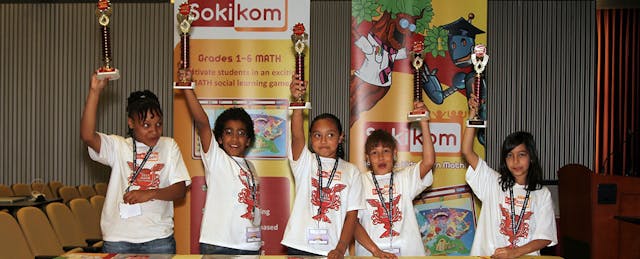Sokikom continues to soak up the grants. The Mountain View, CA-based developer of game-based math exercises and lessons for grades K-6 has received another $1 million from the U.S. Department of Education’s Institute of Education Sciences in the form of two Small Business Innovation Research (SBIR) “Fast Track” grants.
This marks the company’s fourth and fifth SBIR grant--and gives Sokikom the honor of being one of the most frequent recipient since the program began in 2009. The company has received over $2 million from SBIR and also raised $1.5 million in seed capital in 2013.
These grants will fund the development of an online, core math curriculum aligned to the Common Core State Standards. There’s also a stipulation: Awardees must conduct research and regularly report on the effectiveness of the funded projects. On this end, Sokikom’s project activities for this grant include 42 weeks of prototype testing with teachers, followed by a three-month pilot with 20 teachers.
The other key requirement to receiving a SBIR grant--and one that may be more difficult than proving effectiveness--is developing a “commercialization plan for the sale and distribution of the product.”
When it launched in 2008, Sokikom developed a sales strategy similar to what many other startups also had in mind: use the distribution power of the web and social media to get the tool directly in the hands of teachers and parents. As education app marketplaces began to emerge, the company also published some of its games on platforms like the Edmodo app store.
Over one million students and teachers have used Sokikom to date. And along the way, Sokikom racked up a slew of awards.
But trophies do not substitute for revenue. At the end of 2013, Sokikom CEO Snehal Patel and his four team members came to the dire realization that the freemium, direct-to-consumer model was not enough to pay the bills. “We tried everything we could to make the consumers and teachers work, but there came a day when we were brutally honest with ourselves,” Patel tells EdSurge. “We had to re-invent our business as a company or die.”
Sokikom flipped the switch and started selling directly to schools. There were challenges in explaining to customers the change from a freemium to paid service, Patel admits. But buoyed by efficacy research funded by previous SBIR grants, the company has been able to secure school contracts. “This year was the first year where we asked people to pay,” he says. Of all the schools and districts that paid for Sokikom, “100% of them are renewing for the next school year, even some for five years.” The company claims users in over 15,000 schools.
Part of the grant money will also support training teachers how to teach with Sokikom. “With all these edtech programs coming out, we found that classroom integration and getting teachers to effectively use tools with fidelity is a big challenge.” The professional development appears to be paying off: “We had teachers tell us that the games make them look at ways that were different than the way that they were taught at school and taught to teach. In doing so it helped expand their own math knowledge for teaching,” says Patel.


